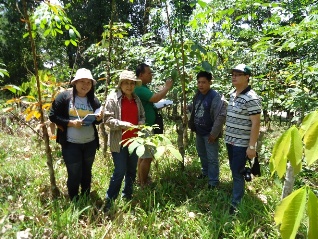 Rubber, one of the key convergence crops and considered as a high-value industrial crop, belongs to a labor-intensive industry supporting more than 1.2 million workers and dependents. In 2011, Philippine production of dry rubber (DR) reached 106,240 metric tons, which accounted for 1.03% of the world’s total production. With the national rubber production, the Philippines ranks eighth among the world’s rubber producing countries.
Rubber, one of the key convergence crops and considered as a high-value industrial crop, belongs to a labor-intensive industry supporting more than 1.2 million workers and dependents. In 2011, Philippine production of dry rubber (DR) reached 106,240 metric tons, which accounted for 1.03% of the world’s total production. With the national rubber production, the Philippines ranks eighth among the world’s rubber producing countries.
In spite of the success of the industry, the rubber latex production sector is still faced with low national annual productivity due to extensive use of seedling-derived planting materials and questionable identities of supposed high-yielding clones acquired from commercial nurseries, among other problems.
For the local industry to keep pace and sustain its economic contribution, the Philippine Council for Agriculture, Aquatic, and Natural Resources Research and Development of the Department of Science and Technology (DOST-PCAARRD) implemented the Rubber Industry Strategic S&T Program (ISP).
One of the programs under the ISP is the development of a protocol to validate the identities of high-yielding rubber clones in commercial nurseries nationwide using DNA fingerprinting. This is to ensure that the clones sold and planted by farmers are the desired and right high-yielding clones.
Following this protocol, validation studies were conducted in 161 commercial rubber nurseries all over the country to ensure the production of true high-yielding clones. This is expected to contribute to the sector’s goal of increasing national annual average yield of rubber plantations from 1.28 metric tons (mt) DR to 1.92 mt DR by 2020. Increased productivity will redound to an increase in farmers’ income by 40%.
Rubber clones, among other results of R&D initiatives in the agriculture, aquatic, and natural resources (AANR) sectors, will be featured during the National Science and Technology Week (NSTW) on July 25-29 at the Council’s complex. This year’s NSTW adopts the theme, Juan Science, One Nation.
The Council will also celebrate its fifth anniversary on July 28, 2016. This will also highlight the National Symposium on Agriculture and Aquatic Resources Research and Development (NSAARRD) on July 27, 2016 in the morning and awarding of papers in the afternoon of the said date. The NSAARRD showcases the most outstanding contributions of individuals and institutions in improving the state of the AANR sectors in the country through research and development.
